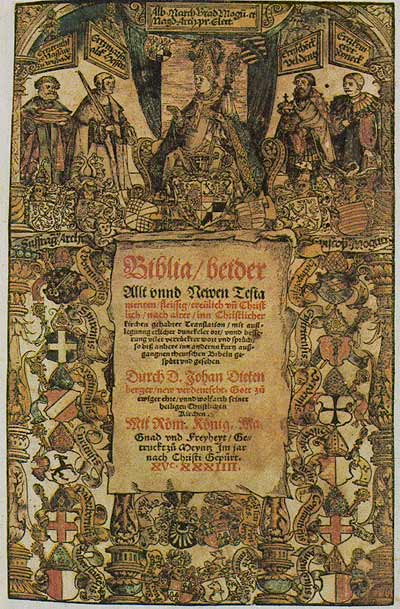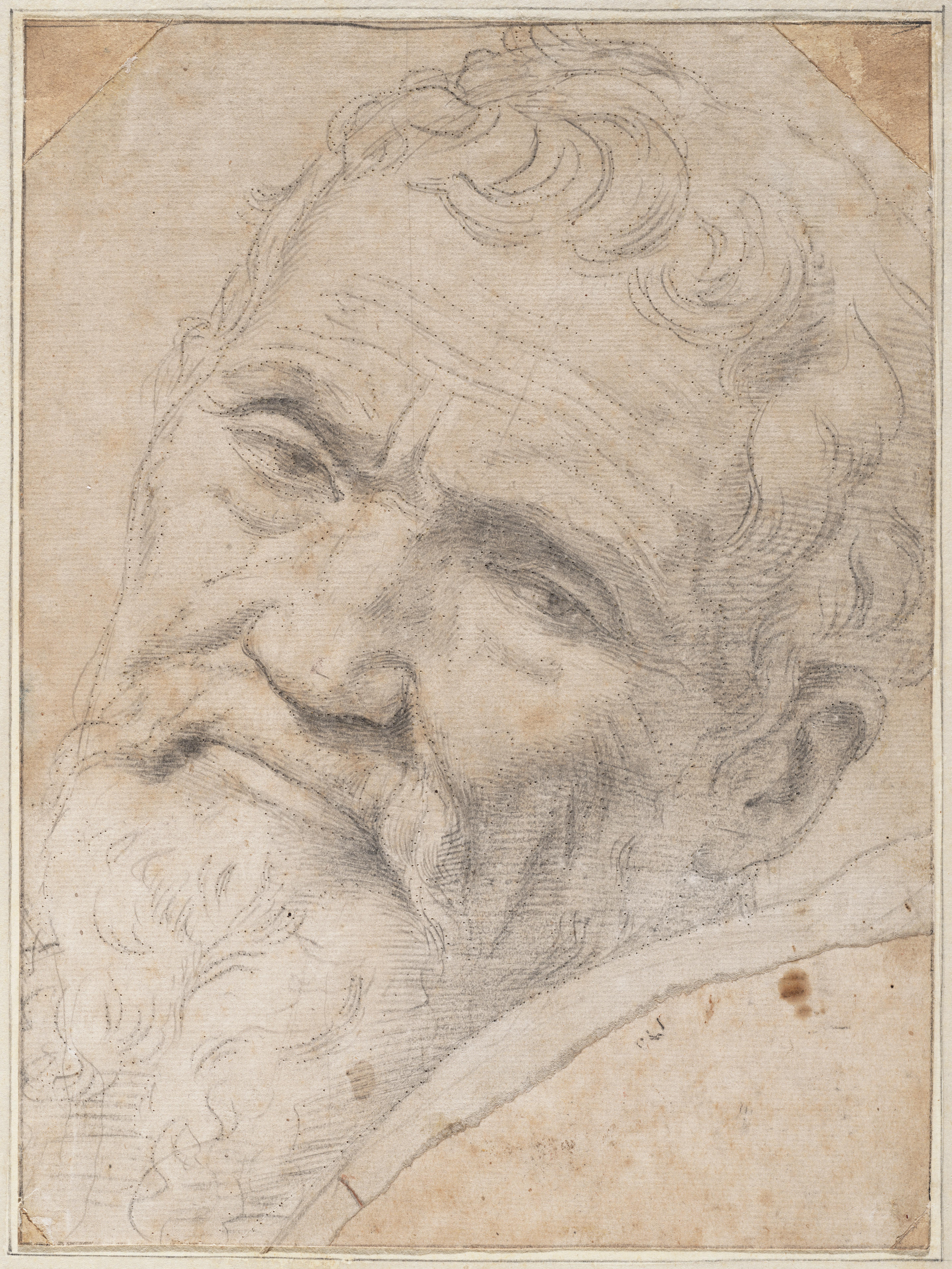|
Johann Dietenberger
Johann Dietenberger (c. 1475 – September 4, 1537) was a German Catholic Scholastic theologian. Education Born at Frankfurt-am-Main, he was educated in his native city, and joined the Dominican Order. On 3 June 1511, he registered at Cologne as a theological student; three years later, 23 September 1514, he was admitted to the licentiate, and the next year, after some time spent at Heidelberg and Mainz, received the doctor's degree. Ordination Towards the end of 1517 Dietenberger was appointed ''Regens studiorum'' and interpreter of Thomas Aquinas at Trier, where he opened his lectures on 27 January 1518. In the meantime he had been elected (1516) prior of his convent at Frankfurt, and he retained this office until 1526, when he became prior at Koblenz. In 1530 Dietenberger attended the Diet of Augsburg and was chosen a member of the committee of twenty Catholic theologians selected at the meeting of 27 June and presided over by Johann Eck, to draw up a refutation of the Pro ... [...More Info...] [...Related Items...] OR: [Wikipedia] [Google] [Baidu] |
German People
, native_name_lang = de , region1 = , pop1 = 72,650,269 , region2 = , pop2 = 534,000 , region3 = , pop3 = 157,000 3,322,405 , region4 = , pop4 = 21,000 3,000,000 , region5 = , pop5 = 125,000 982,226 , region6 = , pop6 = 900,000 , region7 = , pop7 = 142,000 840,000 , region8 = , pop8 = 9,000 500,000 , region9 = , pop9 = 357,000 , region10 = , pop10 = 310,000 , region11 = , pop11 = 36,000 250,000 , region12 = , pop12 = 25,000 200,000 , region13 = , pop13 = 233,000 , region14 = , pop14 = 211,000 , region15 = , pop15 = 203,000 , region16 = , pop16 = 201,000 , region17 = , pop17 = 101,000 148,00 ... [...More Info...] [...Related Items...] OR: [Wikipedia] [Google] [Baidu] |
Kaspar Ulenberg
Kaspar Ulenberg (24 December 1549 – 16 February 1617) was a Catholic convert, theological writer and translator of the Bible. He was born at Lippstadt on the Lippe, Westphalia, the son of Lutheran parents, and was intended for the Lutheran ministry. He received his grammar-school education in Lippstadt, Soest, and Brunswick, and from 1569 studied theology at Wittenberg. While studying Luther's writings there his first doubts as to the truth of the Lutheran doctrines were awakened, and were then increased by hearing the disputes between the Protestant theologians and by the appearance of Calvinism in Saxony. After completing his studies he taught for a short time in the Latin school at Lunden in Dithmarschen; he was then sent by his family to Cologne to convert to Protestantism a kinsman who had become Catholic. After accomplishing this task he remained in Cologne, where, through his friendship with Johann Nopelius and Gerwin Calenius (Catholic countrymen of his), he h ... [...More Info...] [...Related Items...] OR: [Wikipedia] [Google] [Baidu] |
German Dominicans
German(s) may refer to: * Germany (of or related to) **Germania (historical use) * Germans, citizens of Germany, people of German ancestry, or native speakers of the German language ** For citizens of Germany, see also German nationality law **Germanic peoples (Roman times) * German language **any of the Germanic languages * German cuisine, traditional foods of Germany People * German (given name) * German (surname) * Germán, a Spanish name Places * German (parish), Isle of Man * German, Albania, or Gërmej * German, Bulgaria * German, Iran * German, North Macedonia * German, New York, U.S. * Agios Germanos, Greece Other uses * German (mythology), a South Slavic mythological being * Germans (band), a Canadian rock band * "German" (song), a 2019 song by No Money Enterprise * ''The German'', a 2008 short film * "The Germans", an episode of ''Fawlty Towers'' * ''The German'', a nickname for Congolese rebel André Kisase Ngandu See also * Germanic (other) ... [...More Info...] [...Related Items...] OR: [Wikipedia] [Google] [Baidu] |
16th-century German Catholic Theologians
The 16th century begins with the Julian year 1501 ( MDI) and ends with either the Julian or the Gregorian year 1600 ( MDC) (depending on the reckoning used; the Gregorian calendar introduced a lapse of 10 days in October 1582). The 16th century is regarded by historians as the century which saw the rise of Western civilization and the Islamic gunpowder empires. The Renaissance in Italy and Europe saw the emergence of important artists, authors and scientists, and led to the foundation of important subjects which include accounting and political science. Copernicus proposed the heliocentric universe, which was met with strong resistance, and Tycho Brahe refuted the theory of celestial spheres through observational measurement of the 1572 appearance of a Milky Way supernova. These events directly challenged the long-held notion of an immutable universe supported by Ptolemy and Aristotle, and led to major revolutions in astronomy and science. Galileo Galilei became a champion ... [...More Info...] [...Related Items...] OR: [Wikipedia] [Google] [Baidu] |
Clergy From Frankfurt
Clergy are formal leaders within established religions. Their roles and functions vary in different religious traditions, but usually involve presiding over specific rituals and teaching their religion's doctrines and practices. Some of the terms used for individual clergy are clergyman, clergywoman, clergyperson, churchman, and cleric, while clerk in holy orders has a long history but is rarely used. In Christianity, the specific names and roles of the clergy vary by denomination and there is a wide range of formal and informal clergy positions, including deacons, elders, priests, bishops, preachers, pastors, presbyters, ministers, and the pope. In Islam, a religious leader is often known formally or informally as an imam, caliph, qadi, mufti, mullah, muezzin, or ayatollah. In the Jewish tradition, a religious leader is often a rabbi (teacher) or hazzan (cantor). Etymology The word ''cleric'' comes from the ecclesiastical Latin ''Clericus'', for those belonging to ... [...More Info...] [...Related Items...] OR: [Wikipedia] [Google] [Baidu] |
1537 Deaths
__NOTOC__ Year 1537 ( MDXXXVII) was a common year starting on Monday (link will display the full calendar) of the Julian calendar. Events January–June * January ** Bigod's Rebellion, an uprising by Roman Catholics against Henry VIII of England, is crushed. ** Battle of Ollantaytambo: Emperor Manco Inca Yupanqui is victorious against the Spanish and their Indian allies led by Hernando Pizarro. * March – Diego de Almagro successfully charges Manco Inca's siege of Cuzco, thereby saving his antagonists, the Pizarro brothers. * March 12 – Recife is founded by the Portuguese, in Brazil. * April – Spanish conquest of the Muisca: Bacatá, the main settlement of the Muisca Confederation, is conquered by Gonzalo Jiménez de Quesada, effectively ending the Confederation in the Colombian Eastern Andes. * April 1 – The Archbishop of Norway Olav Engelbrektsson flees from Trondheim to Lier, Belgium. * June 2 – Pope Paul III publishes t ... [...More Info...] [...Related Items...] OR: [Wikipedia] [Google] [Baidu] |
1475 Births
Year 1475 ( MCDLXXV) was a common year starting on Sunday (link will display the full calendar) of the Julian calendar. Events January–December * January 10 – Battle of Vaslui ( Moldavian–Ottoman Wars): Stephen III of Moldavia defeats the Ottoman Empire, which is led at this time by Mehmed the Conqueror of Constantinople. * July 4 – Burgundian Wars: Edward IV of England lands in Calais, in support of the Duchy of Burgundy against France. * August 29 – The Treaty of Picquigny ends the brief war between France and England. * November 13 – Burgundian Wars – Battle on the Planta: Forces of the Old Swiss Confederacy are victorious against those of the Duchy of Savoy, near Sion, Switzerland. * November 14 – The original Landshut Wedding takes place, between George, Duke of Bavaria, and Hedwig Jagiellon. * December – The Principality of Theodoro falls to the Ottoman Empire, arguably taking with it the final remnant of the success ... [...More Info...] [...Related Items...] OR: [Wikipedia] [Google] [Baidu] |
Mass (liturgy)
Mass is the main Eucharistic liturgy, liturgical service in many forms of Western Christianity. The term ''Mass'' is commonly used in the Catholic Church, in the Western Rite Orthodoxy, Western Rite Orthodox, in Old Catholic Church, Old Catholic, and in Independent Catholic churches. The term is used in some Lutheranism, Lutheran churches, as well as in some Anglicanism, Anglican churches. The term is also used, on rare occasion, by other Protestant churches. Other Christian denominations may employ terms such as ''Divine Service (Lutheran), Divine Service'' or ''service of worship, worship service'' (and often just "service"), rather than the word ''Mass''. For the celebration of the Eucharist in Eastern Christianity, including Eastern Catholic Churches, other terms such as ''Divine Liturgy'', ''Holy Qurbana'', ''Holy Qurobo'' and ''Badarak'' (or ''Patarag'') are typically used instead. Etymology The English noun ''mass'' is derived from the Middle Latin . The Latin word was ... [...More Info...] [...Related Items...] OR: [Wikipedia] [Google] [Baidu] |
Leo Jud
Leo Jud (; also Leo Juda, Leo Judä, Leo Judas, Leonis Judae, Ionnes Iuda, Leo Keller; 1482 – 19 June 1542), known to his contemporaries as Meister Leu, was a Swiss reformer who worked with Huldrych Zwingli in Zürich. Biography Jud was born in 1482 in Guémar, Alsace, southwest of Strasbourg. Like his later colleague Heinrich Bullinger, Jud was the son of a priest. His father, Johannes Jud, was from Guémar and his mother, Elsa Hochsang, was from Solothurn. He studied at the Latin school in Sélestat with Martin Bucer and in 1499 he matriculated at the University of Basel, where he met Huldrych Zwingli. He began his studies in medicine but switched to theology under the influence of Thomas Wyttenbach. Leo Jud is one of the lesser-known leaders of the Swiss Reformed Church, but his influence was extensive. Jud was ordained by the Church at Rome in 1507, and from 1507-1512 he was a deacon at Saint Theodore in Basel, then, from 1512-18, he served as the preacher at Saint ... [...More Info...] [...Related Items...] OR: [Wikipedia] [Google] [Baidu] |
Protestant Reformation
The Reformation (alternatively named the Protestant Reformation or the European Reformation) was a major movement within Western Christianity in 16th-century Europe that posed a religious and political challenge to the Catholic Church and in particular to papal authority, arising from what were perceived to be Criticism of the Catholic Church, errors, abuses, and discrepancies by the Catholic Church. The Reformation was the start of Protestantism and the split of the Western Church into Protestantism and what is now the Roman Catholic Church. It is also considered to be one of the events that signified the end of the Middle Ages and the beginning of the early modern period in Europe.Davies ''Europe'' pp. 291–293 Prior to Martin Luther, there were many Proto-Protestantism, earlier reform movements. Although the Reformation is usually considered to have started with the publication of the ''Ninety-five Theses'' by Martin Luther in 1517, he was not excommunicated by Pope Leo X ... [...More Info...] [...Related Items...] OR: [Wikipedia] [Google] [Baidu] |
Martin Luther
Martin Luther (; ; 10 November 1483 – 18 February 1546) was a German priest, theologian, author, hymnwriter, and professor, and Augustinian friar. He is the seminal figure of the Protestant Reformation and the namesake of Lutheranism. Luther was ordained to the priesthood in 1507. He came to reject several teachings and practices of the Roman Catholic Church; in particular, he disputed the view on indulgences. Luther proposed an academic discussion of the practice and efficacy of indulgences in his ''Ninety-five Theses'' of 1517. His refusal to renounce all of his writings at the demand of Pope Leo X in 1520 and the Holy Roman Emperor Charles V at the Diet of Worms in 1521 resulted in his excommunication by the pope and condemnation as an outlaw by the Holy Roman Emperor. Luther taught that salvation and, consequently, eternal life are not earned by good deeds but are received only as the free gift of God's grace through the believer's fait ... [...More Info...] [...Related Items...] OR: [Wikipedia] [Google] [Baidu] |
Emser
Jerome (or Hieronymus) Emser (March 20, 1477 – November 8, 1527), German theologian and antagonist of Luther, was born of a good family at Ulm. He studied Greek at Tübingen and jurisprudence at Basel, and after acting for three years as chaplain and secretary to Raymond Peraudi, cardinal of Gurk, he began lecturing on classics in 1504 at Erfurt, where Luther may have been among his audience. In the same year he became secretary to Duke George of Albertine Saxony, who, unlike his cousin Frederick the Wise, the elector of Ernestine Saxony, remained the stanchest defender of Roman Catholicism among the princes of northern Germany. Duke George at this time was bent on securing the canonization of Bishop Benno of Meissen, and at his instance Emser travelled through Saxony and Bohemia in search of materials for a life of Benno, which he subsequently published in German and Latin. In pursuit of the same object he made an unsuccessful visit to Rome in 1510. Meanwhile, he had also ... [...More Info...] [...Related Items...] OR: [Wikipedia] [Google] [Baidu] |









.jpg)

.jpg)